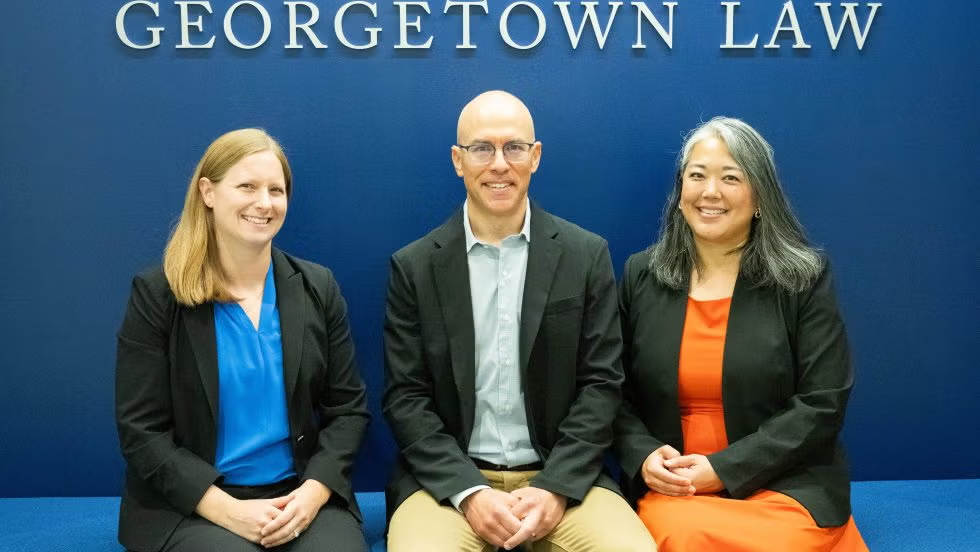Three former Department of Justice (DOJ) lawyers joined the Georgetown University Law Center (GULC)’s Legal Practice program, the university announced Sept. 12.
The three new faculty members — Ben Eisman, Bethany Lipman (LAW ’14) and Frances Walters — will teach first-year law students about legal research, writing and analysis through the program. The addition of the three new professors is part of GULC’s effort to reduce the sizes of class sections to facilitate more professor-student interaction, according to the university press release.

Erin Carroll, chair of the Legal Practice program, said the program aims to hire faculty from a variety of practices and legal backgrounds to offer students diverse legal mentors.
“It’s typical for those of us who teach legal practice that we have significant experience actually practicing law, given that that’s what we’re in the classroom doing with the students,” Carroll told The Hoya. “We have people from all walks of practice. We have people from firms and public service. It’s wonderful to add three people who’ve been so committed to public service.”
Eisman, who served as an attorney advisor in the DOJ’s Criminal Division, said he wants to stress the importance of accountability and counterargument to his law students.
“In order to maintain credibility with your reader, you can’t run away from counterarguments — you have to really engage it,” Eisman told The Hoya. “But how do you effectively engage in counterargument? You have to empathize with it, you have to have an empathetic engagement with the counterargument and truly put yourself in the position of understanding, or try in good faith, to understand where the other side is coming from.”
Lipman, who worked in both the Criminal and Antitrust Divisions of the DOJ and graduated from GULC, said she felt nostalgic returning to campus as a professor.
“I always thought of Georgetown as a second home — I was very involved,” Lipman told The Hoya. “It’s been interesting to come back and see professors who I had. Some of them, it’s like visiting old friends — I’m like, ‘Wait, what do I call you?’”
Lipman said she wants to show students how to communicate complex ideas, which she said is an important skill for practicing lawyers.
“What practice-ready means to me is being able to take complicated areas of law and really clearly break them down and analyse them, and then convey that information to either other lawyers or laypeople, clients, et cetera,” Lipman said.
Walters, who previously served as an attorney advisor for the Office of the Pardon Attorney at the DOJ, said she seeks to bring in her experiences in her curriculum, which she hopes sheds a different light on legal education.
“I’ve definitely tried to draw from cases I’ve worked on,” Walters told The Hoya. “So, for example, on Wednesday, we were talking about statements of fact in a memo, and I talked about how often you might tell a story chronologically, and I was able to give an example of when a chronological telling was really important.”
Justin Dabre (LAW ’27), whose Legal Practice class was taught by Carroll, said the program is one of the most formative parts of the first-year curriculum.
“The legal practice program is probably the most unique course because all the other courses that we take are very doctrinal — they’re all about the cases in the law,” Dabre told The Hoya. “But legal practice is the class where you are actually learning about becoming a lawyer and what you’re going to have to do when you’re actually working.”
Dabre said the new professors’ professional experience is beneficial for students because it diversifies the faculty’s legal backgrounds.
“With these guys coming in from the DOJ, it’s a different perspective that we don’t normally get in the faculty, having someone working on the public side,” Dabre said. “I think that it’s a good thing to have, because not everyone who goes to Georgetown is planning to go into private law — a lot want to go into public law. Having someone who’s been there is good because a lot of legal practice professors serve as mentors, especially in the first year.”
Eisman said he enjoys teaching because he works with students who encourage him to be a better teacher.
“It’s been a fantastic experience and everything that I’ve hoped for,” Eisman said. “The students are so bright, so motivated and so thoughtful and deliberate that they are inspiring when it comes to doing the hard work of teaching.”